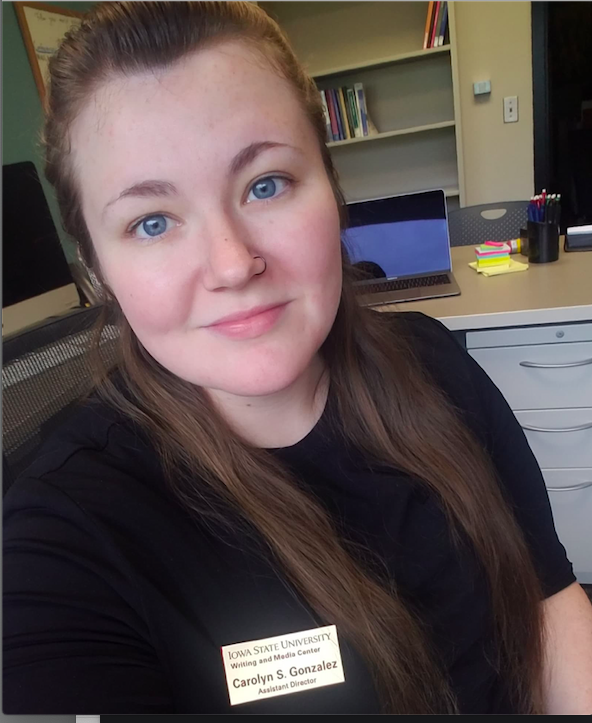Resume event helps first generation students highlight their experiences
Courtesy of Dean of Students Office
Carolyn Gonzalez works at Iowa State’s Writing and Media Center and co-hosted the first generation student resume workshop with Kelly Wenig.
November 7, 2019
Iowa State’s Writing and Media Center hosted the workshop “Landing a Perfect Job: Using your First-Gen Experiences on your Resume” at the Hixson-Lied Student Success Center on Thursday.
Two of the program’s coordinators, Carolyn Gonzalez and Kelly Wenig, led the event. They said their intent was to help students incorporate their first generation college student experiences into their resumes.
Gonzalez, who works as the assistant director of the Writing and Media Center, is a first generation student herself. She has done a lot of work regarding first generation students, which allows her to help them succeed.
“My research in communication studies has kind of focused on the communicative practices of first gen students,” Gonzalez said. “That’s kind of what was motivating the workshop.”
First generation students are the first in their families to attend a four-year university, according to Gonzalez. She said they can face a lot of adversity without the guidance of a parent or guardian who has already attended college.
“Oftentimes, first gen students struggle with networking; that seems to be the biggest issue that research is showing,” Gonzalez said. “[Also,] oftentimes first gen students come from lower socioeconomic backgrounds as well.”
Gonzalez said a common result of a low socioeconomic background is that students tend to work many jobs to support themselves at college. They then don’t have time to participate in extracurricular activities or other opportunities at their university.
Wenig, intercultural learning specialist at the Writing and Media Center, also noted possible challenges first generation students might face, some of which affect a student’s motivation when seeking a job.
“A lot of times, it seems that it’s more of a confidence issue,” Wenig said. “They don’t feel like they have the same exact skills [as others]. It’s that experience gap that we are trying to overcome and help students realize it’s not an experience gap, it’s an experience difference.”
Being unfamiliar to college like a first generation student can be difficult. Nonetheless, Gonzalez said there are positive aspects of being a first generation student as well.
“There is quite a lot of pride and resiliency that comes along with being a first gen student,” Gonzalez said. “[They] have, perhaps, more unique experiences outside of the university that might differ from your peers; there’s also a kind of grit and perseverance in the face of difficulty.”
These “unique experiences” are what Gonzalez and Wenig were targeting at the resume workshop. They said they wanted to help students build resumes to make them stand out as first generation students and highlight their accomplishments because of their circumstances.
After students had time to consider what to include on their resumes, Gonzalez and Wenig continued to explain what content is important. They said students will update their information as they acquire more experience in and out of the workplace.
“Underclassmen might be drawing upon high school experiences — experiences prior to entering college,” Gonzalez said. “Over time, as you start to develop as a professional, some of those things do start falling off the resume, and you start working in the things from your college career.”
Wenig said word choice is important when describing the different parts of your resume. He said to keep content in present tense and to use active verbs.
Once a resume has enough relevant content, it is important to know how to assemble it.
“You do reverse chronological for everything,” Gonzalez said. “For example, if you’re going to be getting your bachelor’s, that goes on the top, and then behind that is your associate’s degree. Same goes for your work experiences. Your most recent is going to go on the top, and then descending down are all your prior experiences.”
When a student is finished with their resume, they will be able to give it to potential employers. Wenig said students should not be using the exact same resume for each job they are seeking, though.
“You should be creating a new resume, or at least tweaking your resume for every position that you apply to,” Wenig said. “You’ll just change the terminology of things a little bit. You’re just adapting it a little bit to mold to a particular job.”
Gonzalez and Wenig said they want first generation students to know there are several resources on campus they can use to help them in their careers.
Students can go to the three writing and media locations to seek a professional’s help with documents like resumes.

















